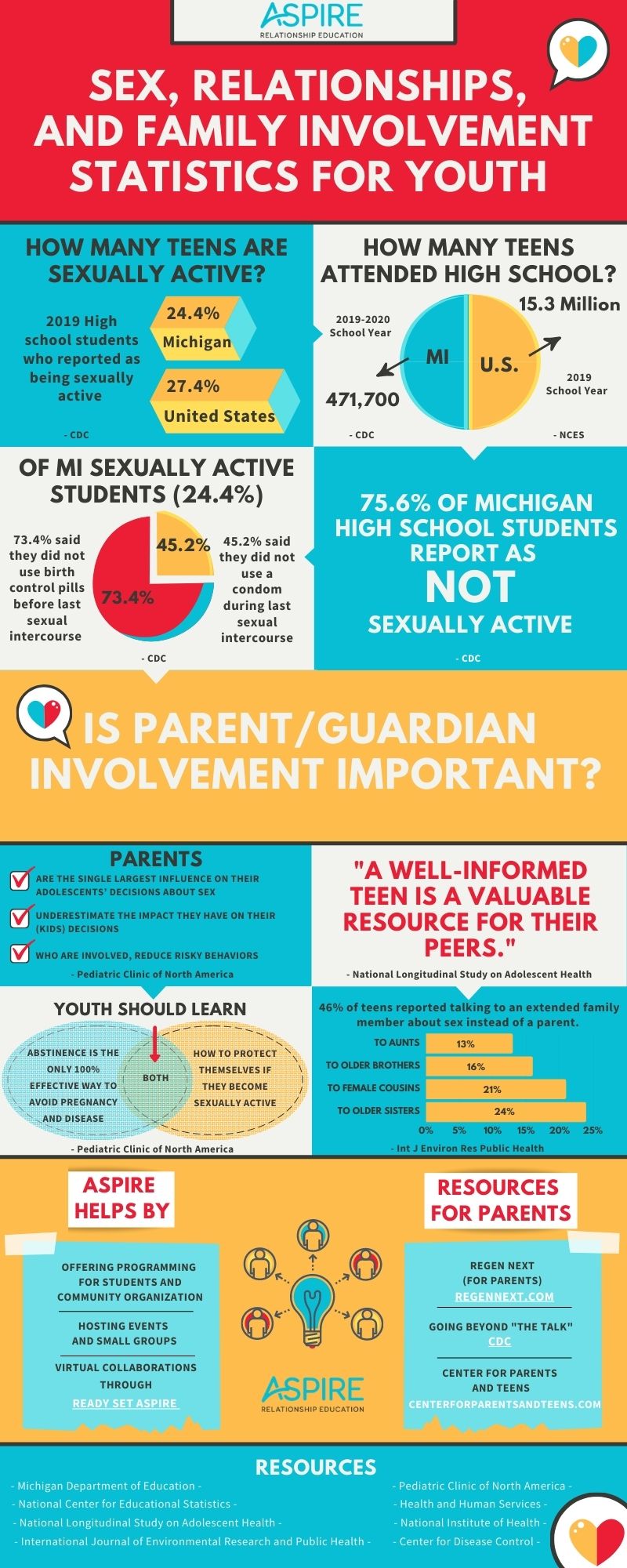Modern Day View: Exploring Sexual Relationships From The Eye Of Fellow Teens
Hello, my name is Alana. I am a teenager, high school senior, and intern for ASPIRE Relationship Education. For my first internship project, I had the chance to interview a couple of my friends. Below, you will find the questions and answers on the topic of teenage/modern views on sexual relationships. Due to the sensitive topic, all individuals will remain anonymous.
First Interview Question
I wanted to give teenagers the opportunity to give their modern opinions on this topic. The first interview question I asked was, “Why do you think some people may want to have sex and why some may not want to have sex?”
- Why answers: Stress reliever, to feel loved, to get revenge, and because they want to.
- Why Not answers: Don’t want regrets, it leads to heartbreak, pain and tears, waiting for the right person, beliefs values and morals, want it to be meaningful, want respect for themselves and their partner, standards and self-control, because they love someone, not ready, want to wait until marriage, practicing self-love and care.
Second Interview Question
The second interview question I asked was, "When do you think people first participate in sexual intercourse?” The purpose of this question was to gauge this generation’s opinions on the subject.
- Female answers (included from ages 12-14 years old): Although they were not positive, this was the case for everyone. They all agreed that the age of youth having sex or participating in sexual encounters seemed to be getting younger.
- Males answers (included preteens and middle school students): They also believed that the age of youth having sex or participating in sexual encounters seemed to be getting younger.
Honest Experiences/Answers
One of the reasons I asked these questions was to get real answers from real people under the age of 21. Because each individual I interviewed expressed slightly different answers, I cannot prove if they were dishonest or not. Therefore, I am presenting their answers just as they gave them to me.
With my first friend, when asked “Why do you think some people do not have sex?” she said: “I feel that people wait because they are looking for that right person to give their virginity to. I actually waited a very long time myself.” This answer includes self-discovery and the realization that some people wait because they want the person they first experience physical intimacy with to have similar values and life goals. This lead me to believe that she was answering honestly because her answer was based on self-discovery tools and skills from her own life experience.
My 17-year-old friend answered the question “Why do you think some people have sex?” She said, “I feel like for some people, it can be an urge or pulling and the older you get the more you want it.” According to the Human Brain Mapping Medical Journal, “The third effect of puberty hormones occurs via reward‐related brain structures such as the nucleus accumbens and dopaminergic pathways to the prefrontal cortex. These effects are necessary for establishing strong motivation to seek out reproductive opportunities.” Because of the hormones in an adolescent’s body, it is medically accurate to say that people are drawn to sexual exploration. Based on the medically-accurate statistics, I believe this friend’s answer to be honest.
Based on the reasoning and statistics behind the answers those interviewed gave, I believe all answers that were given to be honest.
Real Life vs. Fake Answers
According to Health and Human Services, “One source of Anxiety for Teens is saying too much: revealing sexual thoughts or behaviors to the parent that might elicit criticism or punishment.”
This being the case, we assume most teens hesitate to tell their parents or legal guardian their honest thoughts when it comes to the topic of sex and sexuality. Due to my position as a fellow teen, I wanted the opportunity to interview my peers to create a safer environment, without them fearing criticism or punishment. I also wished to provide evidence that if parents create a safe space for their children, youth may be more likely to open up and have an honest conversation about sex and sexuality. While I was interviewing my peers, I paid special attention to the answers they gave, trying to determine if it would be something they would share with their parents.
Two of the answers given were:
“Not experiencing sex or waiting is something I feel not many people do anymore. I feel like anybody can wait if they truly want to. It's really out of respect for themselves, both female and male.”
“I feel experiencing sex is about keeping a reputation nowadays and is the next step for some couples. I feel like both females and males have the same level of drive to be sexually active.”
Some people could share the statements listed above with their parents, but it all depends on how comfortable they feel. If you were a parent, how would you respond to either of these statements if your teen said them? If you get upset, your teen may not be comfortable talking with you. If they don’t talk with you about these topics, who will they talk to instead? Practicing being more comfortable with conversations like these will help you communicate better with your teen.

Truth Vs. Uncredited information
While interviewing, there were ideas shared that caused me to want to do further research to find out the statistical answers. The first idea that my interviewees shared that I wanted to research, was the idea that the age of youth participating in sexual intercourse was becoming younger and younger.
After researching, I found statistics from the Centers for Disease Control and Prevention (CDC) stating,
“In 2019, 2.5% of Michigan high school students reported having sex before the age of 13 years old.”
“In 2019, 3.0% of US students reported having sex before age 13, compared to 3.4% of US students who reported having sex before the age of 13 in 2017.”
“In 2019, 3 of the nine participating US states reported that middle school students were more sexually active than 2017.”
“From 2017 to 2019, nine states reported on middle school 8th graders being sexually active. Out of these nine states, five states reported a decline in 8th graders ever having sexual intercourse.”
“From 2017 to 2019, nine states reported on middle school 7th graders being sexually active. Out of these nine states, seven states reported a decline in 7th graders ever having sexual intercourse.”
“From 2017 to 2019, seven states reported on middle school 6th graders being sexually active. All seven states reported a decline in 6th graders ever having sexual intercourse.”
Based on the reports from the CDC, I can come to one of two conclusions: Youth under the age of 13 are not reporting sexual activity as much, or the amount of students having sex while under 13 years old is less. Using these statistics from the CDC only, I am liable to believe that the idea that The age of youth participating in sexual intercourse is becoming younger is not entirely true.
The purpose of this blog post was to find information on the topic of teenage/modern views on sex, sexuality, and sexual relationships. By interviewing my peers, I believe we found relevant information on sex, sexuality, and sexual relationships in their Honest Experiences answers, their Real Life vs Fake answers, and the research done for Truth vs. Uncredited Information statistics. Above all, this reinforced the need for honest conversations between peers as well as honest conversations between trusted adults and youth around these topics.





